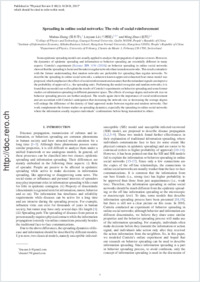Spreading in online social networks: The role of social reinforcement
- Zheng, Muhua College of Physics and Technology, Guangxi Normal University, Guilin, China
- Lü, Linyuan Institute of Information Economy, Alibaba Business School, Hangzhou Normal University, China - Department of Physics, University of Fribourg, Switzerland
- Zhao, Ming College of Physics and Technology, Guangxi Normal University, Guilin, China
-
30.07.2013
Published in:
- Physical Review E. - 2013, vol. 88, no. 1, p. 012818
English
Some epidemic spreading models are usually applied to analyze the propagation of opinions or news. However, the dynamics of epidemic spreading and information or behavior spreading are essentially different in many aspects. Centola's experiments [ Science 329 1194 (2010)] on behavior spreading in online social networks showed that the spreading is faster and broader in regular networks than in random networks. This result contradicts with the former understanding that random networks are preferable for spreading than regular networks. To describe the spreading in online social networks, a unknown-known-approved-exhausted four-status model was proposed, which emphasizes the effect of social reinforcement and assumes that the redundant signals can improve the probability of approval (i.e., the spreading rate). Performing the model on regular and random networks, it is found that our model can well explain the results of Centola's experiments on behavior spreading and some former studies on information spreading in different parameter space. The effects of average degree and network size on behavior spreading process are further analyzed. The results again show the importance of social reinforcement and are accordant with Centola's anticipation that increasing the network size or decreasing the average degree will enlarge the difference of the density of final approved nodes between regular and random networks. Our work complements the former studies on spreading dynamics, especially the spreading in online social networks where the information usually requires individuals' confirmations before being transmitted to others.
- Faculty
- Faculté des sciences et de médecine
- Department
- Département de Physique
- Language
-
- English
- Classification
- Physics
- License
-
License undefined
- Identifiers
-
- RERO DOC 136730
- DOI 10.1103/PhysRevE.88.012818
- Persistent URL
- https://folia.unifr.ch/unifr/documents/303176
Statistics
Document views: 135
File downloads:
- pdf: 383
